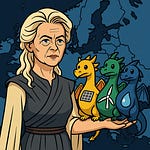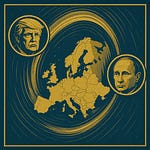The European Union is often perceived as a political and economic project in perpetual crisis, grappling with disagreements over monetary policy, fiscal rules, and financial governance. But beneath the policy debates and institutional clashes lies something even more fundamental: a battle of ideas—conflicting economic philosophies that shape how Europe is governed.
In this edition of Brussels Book Club, part of EuroPragmatist, we dive into The Euro and the Battle of Ideas by Markus Brunnermeier, Harold James, and Jean-Pierre Landau. This book isn’t just about the euro as a currency—it’s an intellectual exploration of how deep-seated economic beliefs drive EU decision-making, often leading to conflict and unintended consequences.
The Authors and Their Perspective
Markus Brunnermeier, an economist at Princeton University, is renowned for his work on financial crises and monetary policy. Harold James, a historian, brings a rich understanding of Europe’s economic past, while Jean-Pierre Landau, a former French central banker, offers insights into the policymaking world. Together, they dissect the ideological divide that has shaped Europe’s monetary union.
Their argument? The eurozone’s challenges aren’t merely technical—they’re philosophical. Different European nations hold vastly different views on debt, inflation, and economic intervention, and these differences create friction in moments of crisis.
Core Ideas: The Clash of Economic Visions
At the heart of the book lies the fundamental divide between Northern and Southern Europe—a divide rooted in contrasting economic traditions.
Germany and the North: A strong emphasis on stability, rules, and austerity, shaped by post-WWII experiences with hyperinflation. For Germany, economic discipline is non-negotiable; fiscal responsibility ensures long-term prosperity.
France, Italy, and the South: A tradition of intervention, flexibility, and state-led solutions to economic problems. These countries view government spending and proactive monetary policy as essential tools for economic stability.
This clash manifests in every major EU economic debate—from the response to the 2008 financial crisis and the eurozone debt crisis to pandemic recovery funds. While Germany and its allies advocate for strict spending limits, Southern nations argue for more fiscal flexibility to promote growth and prevent social unrest.
Why This Battle of Ideas Matters More Than Ever (as of February 2025)
Fast forward to today, and these ideological battles continue to shape Europe’s biggest decisions. As of February 2025, the EU faces new challenges that make this book’s insights more relevant than ever:
Post-Pandemic Economic Recovery: The pandemic forced Europe to temporarily embrace policies that broke old taboos—such as joint EU borrowing for the recovery fund. But will that solidarity persist, or will we see a return to strict fiscal rules?
Inflation and Monetary Policy: The European Central Bank has been balancing inflation control with economic growth. How do different EU countries interpret the ECB’s role, and do they agree on its priorities?
Geopolitical Pressures: The war in Ukraine, energy security, and supply chain shifts have challenged previous economic doctrines. The EU is moving towards industrial policy and strategic autonomy, but will the North-South divide slow down this transition?
The book forces us to see these issues not as isolated events, but as expressions of long-standing economic philosophies that continuously shape policymaking.
Lessons for Policymakers and Citizens
Beyond financial markets and Brussels policymaking, this book offers critical lessons for everyday citizens trying to make sense of EU politics.
Economic Policy Is About More Than Numbers – It’s not just about what’s “right” or “wrong” in economic terms; different nations have deeply embedded philosophies about money, debt, and government intervention.
Understanding the EU Requires Context – Decisions that seem irrational (like opposition to debt mutualization) often stem from historical experiences that still influence national thinking.
Compromise Is Messy But Necessary – The EU thrives not because it finds perfect solutions, but because it manages to balance conflicting ideas enough to move forward.
As citizens, understanding these economic divides allows us to engage in more informed debates and recognize the trade-offs involved in policymaking. There are no easy answers—just different perspectives that need to be reconciled.
A Path Forward? The Idea of an “Economic Ideas Union”
One of the book’s most ambitious proposals is the need for a more structured debate on economic philosophies within the EU—an Economic Ideas Union. The goal wouldn’t be to enforce a single vision but to create a space where different approaches to economic governance can be openly discussed, tested, and adjusted over time.
But is this realistic? Given how difficult it already is to achieve basic political unity, could a deeper economic dialogue bring Europe together, or would it further expose ideological divisions?
The book doesn’t offer easy answers—but it does provide a framework for understanding why the EU struggles with economic policymaking and how a more open debate could lead to better solutions.
Final Verdict: Is This Book Worth Reading?
Absolutely. The Euro and the Battle of Ideas isn’t just a book about economic policy—it’s about history, culture, and psychology. It explains why EU economic debates often feel stuck in endless cycles and how historical memory and ideology shape everything from budget rules to crisis management.
For anyone trying to grasp why Europe’s economic governance is so complicated—whether you’re a policymaker, an investor, or just someone following the news—this book provides essential context.
Instead of seeing the EU as just a collection of bickering governments, you start to appreciate the philosophical stakes behind the decisions. And that realization is crucial—not just for experts but for all of us.
Closing Thoughts: What’s Next for Europe?
As we wrap up this edition of Brussels Book Club, one thing is clear: The battle of economic ideas in Europe isn’t going away. The question is—can the EU evolve beyond rigid ideological divides, or will these tensions continue to shape its future?
If you enjoyed this discussion, stay tuned for next week’s episode, where we’ll explore another thought-provoking book on Europe’s past, present, and future. And as always—keep the conversation going. Europe’s success depends on our ability to listen, debate, and find common ground.












